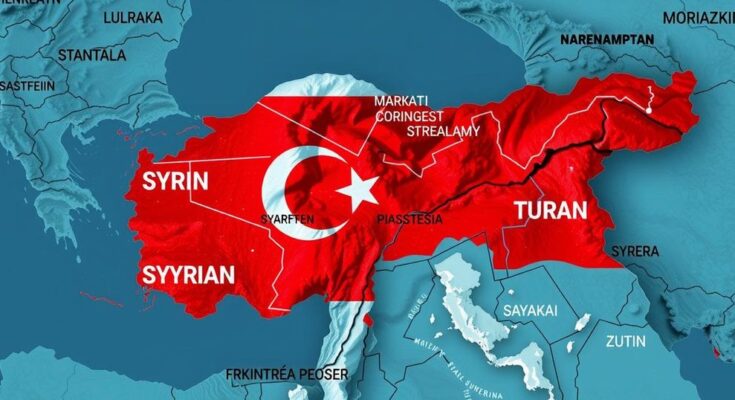Turkey has indicated its plans to assist in the revival of oil and gas production in Syria, focusing on energy supply enhancements and collaboration on infrastructure projects. This strategic interest emerges amidst Syria’s ongoing struggles with energy production due to international sanctions and political upheaval, particularly following the cessation of supplies from key partners such as Iran and Iraq. Turkey’s approach could significantly influence the reconstruction efforts in Syria.
Turkey has expressed its intention to actively participate in the revitalization of oil and gas production in Syria, as indicated by a recent announcement from Alparslan Bayraktar, Turkey’s Energy Minister. In his remarks to the press, Bayraktar stated that Turkey is currently examining ways to assist Syria with its electricity needs, and he highlighted that collaboration in the oil and gas sectors is also being considered.
“We are also studying the use of crude oil and natural gas for reconstruction of Syria,” stated Bayraktar, emphasizing Turkey’s commitment to contribute to the development of these resources. He further mentioned plans for constructing new oil and gas pipelines connecting Syria and Turkey, signaling a strategic move to bolster Turkey’s role in the region.
As Syria grapples with its oil and gas production challenges, largely exacerbated by U.S. sanctions and ongoing conflicts involving rebel factions, the country has historically relied on imports from Iran and Iraq. However, following a recent political upheaval that led to the overthrow of the Assad regime, Tehran’s oil shipments have ceased, with reports of a tanker reversing course before reaching Syria. Notably, Iran had been supplying around 60,000 barrels of oil daily to Syria.
The crisis deepens as Iraq has similarly halted its oil exports to Syria after delivering approximately 120,000 barrels daily. This disruption, coupled with the cessation of crude transfers from eastern Syria—an area controlled by the Kurdish-affiliated Syrian Democratic Forces—has created a significant supply shortage. The remaining regions of Syria are currently under the governance of Hay’at Tahrir al-Sham, a group that has garnered contentious distinctions, notably recognized as a terrorist organization in the past.
This combination of political shifts and supply disruptions underscores the precarious situation in Syria’s oil and gas sector, amplifying Turkey’s potential involvement as both a strategic partner and a key player in the revival of Syria’s energy landscape.
The situation surrounding oil and gas production in Syria involves complex geopolitical dynamics, particularly influenced by international sanctions and internal conflict. Historically, Syria has depended on energy imports from neighboring countries while facing significant domestic production challenges. The recent political upheaval in Syria has disrupted existing energy supply chains, particularly impacting relations with traditional suppliers such as Iran and Iraq. The involvement of entities like the Kurdish Syrian Democratic Forces adds another layer of complexity to the situation, indicating a shift in control over oil resources. Turkey’s interest in engaging in Syrian energy production marks a significant pivot that could reshape the energy landscape in the region.
Turkey’s expressed desire to engage in Syria’s oil and gas revival highlights both the challenges facing Syrian energy production and Turkey’s strategic ambitions in the region. With the cessation of oil supplies from Iran and Iraq due to recent political events, Turkey aims to fill the gap, facilitating the reconstruction of Syria through energy projects. However, the existing divisions within Syria further complicate these prospects, necessitating careful navigation of the geopolitical landscape in pursuit of collaboration.
Original Source: oilprice.com




